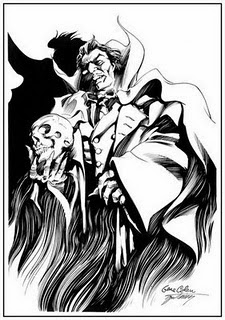The art-horror; horror writing Horror stories The nature of Horror, by Noel Carroll
Abraham "Bram" Stoker (November 8, 1847 – April 20, 1912) was an Irish novelist and short story writer, best known today for his 1897 Gothic novel Dracula. During his lifetime, he was better known as personal assistant of actor Henry Irving and business manager of the Lyceum Theatre in London, which Irving owned.
Dana Gioia: Vampire's Serenade (Aria from Nosferatu)
I am the image that darkens your glass,
The shadow that falls wherever you pass.
I am the dream you cannot forget,
The face you remember without having met.
I am the truth that must not be spoken,
The midnight vow that cannot be broken.
I am the bell that tolls out the hours.
I am the fire that warms and devours.
I am the hunger that you have denied,
The ache of desire piercing your side.
I am the sin you have never confessed,
The forbidden hand caressing your breast.
You've heard me inside you speak in your dreams,
Sigh in the ocean, whisper in streams.
I am the future you crave and you fear.
You know what I bring. Now I am here.
G. David Keyworth: Was the Vampire of the Eighteenth Century a Unique Type of Undead-corpse?
Folklore
Volume 117, Issue 3, 2006
Abstract
In his Treatise
on Vampires and Revenants (1746), Calmet argued that although Western
Europe may have witnessed troublesome revenants in the past, the vampires of Eastern Europe were a unique type of undead-corpse. In
this paper, I examine the characteristic features of the various types of
undead-corpse that supposedly existed in Europe from the medieval period to the
Enlightenment, so too the revenants of nineteenth-century New
England. I argue that, unlike other types of undead-corpse, the
distinguishing feature of eighteenth-century vampires was their apparent thirst
for blood.
Introduction
The Slavic
notion of blood-sucking corpses arose in south-eastern Europe sometime in the
early medieval period (Perkowski 1989, 18), and by the eighteenth century
belief in their existence was so extensive that in Poland, for example, not to
believe in vampires was tantamount to heresy (Calmet 2001, 333). Popular fascination with
revenants was further fuelled by reports of vampire outbreaks erupting across Eastern Europe in the early decades of the eighteenth
century. In their wake, the Austro-Hungarian authorities, under whose
jurisdiction the occurrences took place, enacted legislation to quell the
situation, conducted official investigations into the matter and documented
their findings. The Visum et Repertum (1732), for example, is the
official report into the activities of a reputed vampire, Arnod Paole, and his
undead progeny, that supposedly haunted a Serbian village and killed many of
the inhabitants. Furthermore, the Church hierarchy and educated elite embarked
upon an ambitious programme to re-educate and “enlighten” the masses of eastern
Europe and to discourage popular belief in the existence of revenants
(Klaniczay 1987, 166–74).
Subsequently,
the vampire outbreaks inspired many learned dissertations on the topic, the
most influential and well known being that of Augustin Calmet, a respected
Benedictine scholar and antiquarian from Lorraine,
France (Bennett 2001, xiii–xiv). In 1746, Calmet
published his best-selling compendium on vampires and revenants, Dissertations
sur les apparitions des anges, des démons et des esprits: Et sur les
revenants et vampires de Hongrie, de Bohème, de Moravie et de Silésie. A
revised edition appeared in 1751, which was subsequently re-edited and
translated by Rev. Henry Christmas in 1850 and renamed The Phantom World.
[1] According to Calmet, however, blood-sucking
corpses were unknown in Western Europe until
the late seventeenth century, some sixty years prior to the publication of his
treatise. And, although there may have been troublesome undead-corpses in Western Europe during the past, the Slavic vampires of
the eighteenth century were unique:
In this
age, a new scene presents itself to our eyes and has done for about sixty years
in Hungary, Moravia, Silesia and Poland; men, it is said, who have been dead
for several months, come back to earth, talk, walk, infest villages, ill use
both men and beasts, suck the blood of their near relations, destroy their
health and finally cause their death; so that people can only save themselves
from their dangerous visits and their hauntings, by exhuming them, impaling
them, cutting off their heads, tearing out their hearts, or burning them. These
are called by the name of oupires or vampires, that is to say, leeches …
In the twelfth century also, in England
and Denmark, some
resuscitations similar to those of Hungary were seen. But in no
history do we read anything similar, so common, or so decided, as what is
related to us of the vampires of Poland,
Hungary and Moravia (Calmet 2001, 207–8).
Vampire Academy (Director: Mark Waters)
Starring
Zoey Deutch
Lucy Fry
Danila Kozlovsky
Rose Hathaway is a Dhampir, half human-half vampire, a guardian of the Moroi, peaceful, mortal vampires living discreetly within our world. Her calling is to protect the Moroi from bloodthirsty, immortal Vampires, the Strigoi.
Clark Ashton Smith: The Poet Talks with the Biographers
O ghouls of fetid and funereal midnights,
Say, what do you uncover in your sad labors?
—We have disinterred the Empusa of thy fears
And the frightful Gorgon with her livid eyeballs
In our mournful labors.
O diggers all so diligent, O sapient ghouls,
What have you found in your prodigious toils?
—We have exhumed with all their antique evils
Thy loves, with features gutted by the worms,
In our enormous toils.
Grimed openers of pyramid and ossuary,
What revealed ye yesterday at crimson evening?
—We have dug up the black and ashen soil
To anatomize the shroudless nymph
Who was laid to sleep at evening.
Ghouls, what would ye do, tonight, for your pleasure,
Within these low, lugubrious and gaping tombs?
—We come to disenswathe the living dead—
The never-gelded fauns of thine old vices—
Within these gaping tombs.
Subscribe to:
Posts (Atom)





